#brianblanchfield
Explore tagged Tumblr posts
Text
PROCESS, ONE: A READER’S JOURNEY
“The essays in this book were memoir until they couldn’t stand to be memoir anymore.” —Leslie Jamison
Had I read that quote even only six months ago (the book to which she refers is her much-lauded personal essay collection The Empathy Exams), I wouldn’t have known exactly what it meant.
How can a piece of writing evolve from memoir? In terms of simple, unvarnished truth-telling, I thought the memoir, as a genre of literature, was pretty much the vessel. Yet here a case is being made for something that sounds like the opposite: it seems one can go beyond even the once terminally-regarded memoir.
Let me think about this further, about my confusion. Maybe my framing is off. Maybe it’s not an issue of evolution or reduction. It’s not that the personal essay is somehow purer than the memoir, as far as autobiographical writing is concerned. The issue is not one of authenticity. It’s about application, or even misapplication, that the quest for truth for which one naturally uses the data of one’s own life could, depending on the circumstances, be more appropriately undertaken in a different genre. The two genres are merely looking at different subject matter. They’re examining completely different lifeforms on the slides, but they’re using the same authentic microscope, as it were.
I relate to the sense of frustration in the Jamison quote, that there’s a feeling that the mission she started out on—writing a memoir—became so inadequate for the real task at hand that it became unbearable, that the pressure of working under a false guise gave way to a different form of transmission.
The memoir became a personal essay collection. It had to. The questions she was exploring could not be undertaken by simply telling the story of one’s own life. Personal data was necessary for the full picture. But she needed other sources, the experiences of others, the realities of phenomena outside of her normal experience, even as they were phenomena that ultimately she ended up relating to in a deeply intimate manner. In her collection, she let us into those experiences, and then we were able to relate, by dint of her fearless storytelling and personal excavations.
Now I’m getting it: a personal essay is fixed on some question and that is what drives the exploration. Personal, say, autobiographical, details are needed for the exploration, and this can vary depending on the subject. But the focus is the external question. That is the different lifeform on the slide. It’s about the question being pursued.
I.
But first, a look at where I started on this journey, with the memoir itself.
The memoir as a work of literature was my singular focus while I was crafting my book proposal a couple of years ago. Simply put, it was what was on the table. Owing to my provenance as a musician and an actor, and my express interest in writing about my life, the genre of the memoir naturally became a thing for me.
So I dove into acquainting myself, not with examples of celebrity memoirs or memoirs by politicians—perhaps the two most popular varieties—but with examples of the finer possibilities in those genres which—big surprise—happen to be written for the most part by writers. I found myself falling in love with the exercise of memoir writing, as opposed to, say, the gratuitous voyeurism that is often offered by the popular variants of the genre.
For me, what became valuable was the quality of the writing; most of the time I was reading the life stories of people with whose work I had, outside of the memoir being read, little to no familiarity. These windows into life were captivating in their own right, these portals into raw experience, the possibilities of narration within the genre of nonfiction, the enlightened self-awareness made evident in sculpting large-scale timelines of one’s own life.
----------------------------------
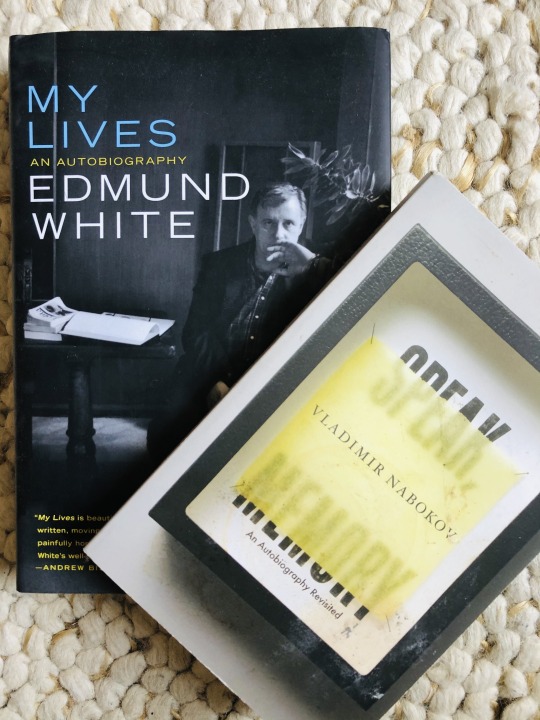
It’s difficult for me to overstate the degree to which these two books have influenced me thus far.
Nabokov’s memoir is well-known. It’s a work of literature in its own right. It is a great example of the possibilities of the memoir to accomplish something other than realism: the whole thing is a kind of Proustian meta-narrative of his childhood and abrupt departure from Russia after the revolution, like a dream of family life written down. Mary Karr, in The Art of Memoir, heads her chapter on this book, “Don’t Try This at Home: The Seductive, Narcissistic Count.” Indeed, the book reads somewhat Transylvanianly, a bold, exotic yarn full of strange characters unfurled for an audience unfamiliar with that way of life. It reads as alluring and dark, and, yes, quite vampiric. But it is also profound and gorgeous.
While it’s not really a memoir, more of an autobiography, and also not often regarded as exemplary of the form, My Lives, written by Edmund White is an incredible tour de force of portraiture of the most important people in his life, his therapists, his parents, his lovers, his friends, his subjects, they all get a chapter dedicated specifically to them. Imagine knowing a world-renowned painter who decides he wants to do a string of portraits of the most important people in his life and you are one of them. That’s what this is, in literary form. It’s less a story of him than of these people, but, by the end of the book, you, of course, end up knowing a lot about him. His ability to make you see the things that he is looking at, in a very concrete, physical way—the curves of a body, the angles of a face, the ambience of a train station—is unparalleled in my view.
Is there a difference between an (a) autobiography and a (b) memoir?
I think the difference is about scope. The autobiography is explicitly a functional genre that attempts to document a person’s entire life. It is a biography that is written by the person whose life is being written about. It does not usually try to invoke any literary devices and is intended to serve as an ancillary to consumption of the subject’s work outside of the autobiography. It is a kind of “reader” of the subject’s life. It’s main purpose is not to be written well (although if it isn’t it is a grave mistake), it is to convey the near entirety of the subject’s experience on earth.
By contrast, good writing is a bit more called-for in the memoir; otherwise the whole premise falls apart. The memoir, in carving out a specific “slice” of a person, either a period of time or some type of encounter or some activity that they always do, is explicitly intended to amplify and interrogate aspects of being. In this way, the memoir has more potential for inspiration and edification irrespective of the reader’s interest in the subject’s life outside of the memoir. This, to me, is the crucial difference.
For the most part, I am not explicitly a huge fan of the work of the writers below. But their memoirs have touched and inspired me. I don’t think I would have all that much interest in reading the autobiography of, say, Joan Didion. (I might, I can’t be sure, of course). But my point is that I’m not looking for her autobiography, whereas there’re a lot of Didion fans out there that would be waiting for said autobiography.
In this way, autobiography is a kind of fan service, whereas the memoir is a thing unto itself. It is a work of literature written for the purpose of refracting aspects of being alive. To appreciate that type of writing you need not be familiar with anything else that person has done on this planet, anymore than that it is necessary to be familiar with Herman Melville’s entire oeuvre in order to love and appreciate Moby Dick.
It was with the consciousness of the memoir’s self-sufficiency, the irony of its ability to communicate, in its more specific mode, even more broadly than the supposedly more capacious autobiography, that I continued my exploration of the genre and began taking notes for the writing of my own memoir (which is now a personal essay collection, but more on that later).
----------------------------------
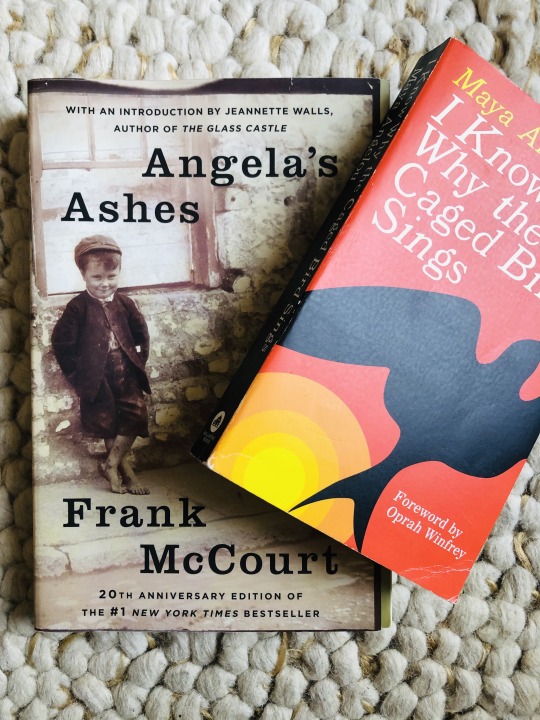
Two classics of the genre, here.
Many of us have read Maya Angelou’s book in high school. Both focus on the same thing: a period of time starting from birth and leading just up to late adolescence. Both are written like traditional first-person stories with beginnings, middles, and ends, and, were it not for our knowledge of their source material, might easily pass as romans a clef. I also think that both are examples of “misery lit,” although I think that that genre is overly hip and reductive for Angelou’s work, which is about so much more than just her misery. But they both focus on their childhood traumas in such a plain, unadorned, simple way, it is shocking and, for those of us struggling with these same issues, healing.
----------------------------------
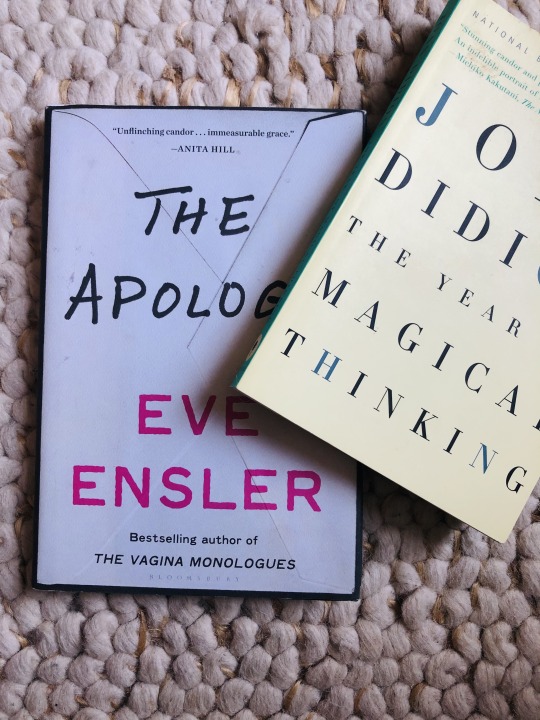
The Apology and The Year of Magical Thinking are examples of how the memoir can focus to a degree of incredible specificity. Both focus on pain but are concerned with different parts of experience. Didion writes only about one year of her life, while Ensler writes about almost the entirety of it, but with a focus on a single, prevailing experience. Both are harrowing in completely different ways and both are exquisite in the way they lift up their struggles to find meaning and truth, things that pertain to the reader’s own experiences and which he or she may also come into touch with in reading these books. They truly are gifts in that regard.
In a manner of speaking, these two books are like two, very long, book-length personal essays. They rigorously explore and interrogate their premises and do their best to extract whatever possible that is meaningful out of that exploration.
----------------------------------
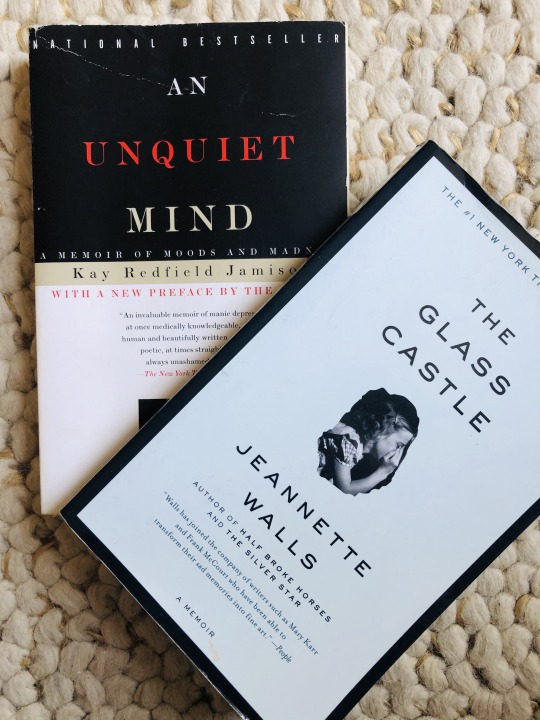
More “misery lit”! I actually don’t mean to be reductive in saying that. Both of these are fabulous stories concerning completely different encounters with mental illness and they are far beyond some hipster term of art. But there is a lot of memoir writing out there that explores the darker ways some of us were brought up and I don’t think there’s anything wrong with simply naming a certain type of writing that courageously explores how our childhoods might have been compromised.
In The Glass Castle it’s about her father’s mental illness and in An Unquiet Mind, it’s about the author’s own journey discovering and treating her bipolar disorder. Walls writes her story very much like it’s a novel, like Angelou’s memoir, and, also like Angelou, she writes it from the perspective of her child self and it is a compelling account as a result, full of tragic innocence and complicated encounters far beyond the reach of a child to properly grapple with.
Jamison’s book is very clinical, although she recounts her episodes frankly and shockingly and really brings you in to her subjective experience of insanity. These two books—not to mention Eve Ensler’s—have given me the courage to begin exploring my own encounters with mental illness and childhood trauma and to commit those experiences to writing.
----------------------------------
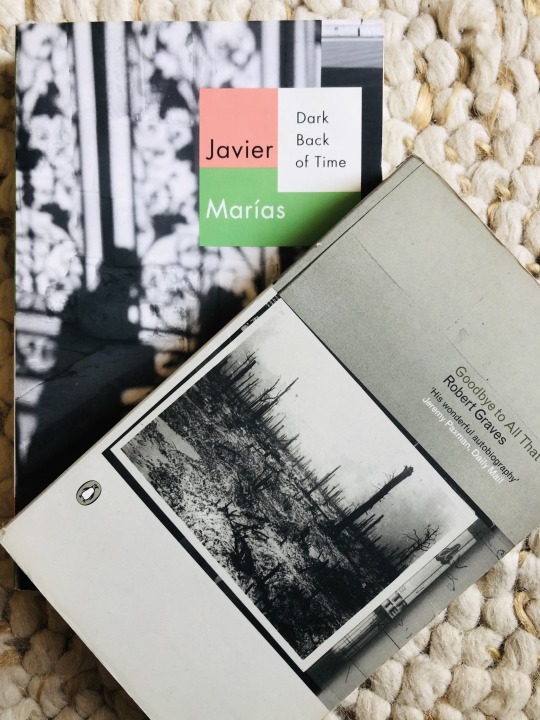
As I continued to research I started coming upon a very interesting type of memoir, the experimental memoir. That’s really interesting I thought. How does one write a memoir as a form of experimental art?
Not that this one is expressly experimental, but Robert Graves’ book is slightly off-putting in that fecund, experimental way: the bulk of it is dedicated to his experience in the trenches and it’s told with grit and harsh realism. But it starts with his schooldays and ends briefly, and curiously inconclusively, with scenes of fatherhood and tutelage. It’s a rather unique rendering of a life. Towards the end he admits that his original idea was to use the notes that he took on the frontlines for writing a novel but changed his mind after realizing that he would be desecrating his experiences and his memories and his sacrifices by layering a plot and storyline onto them. He then decided to write it simply as a factual account.
Dark Back of Time, however, is a full-on experiment in autobiography and it is always slipping in and out of reality, imagination and historicization. He spends a large amount of time writing about an old soldier who died accidentally on a hotel balcony in South America but he gets to this through talking about the reactions that his peers in Oxford had to one of his novels which they suspected made use of their lives. Truly an eye-opening experience to read autobiographical material refracted in this way.
----------------------------------
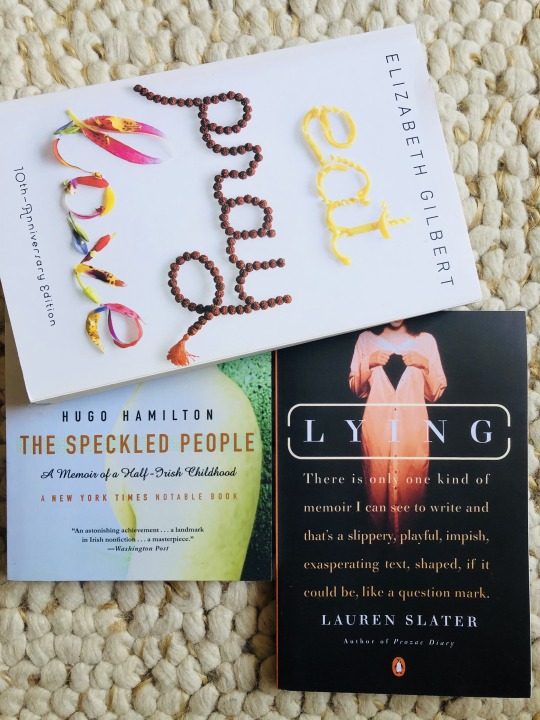
I haven’t read these three yet. They are “on deck,” as it were. Eat, Pray, Love needs little introduction, obviously. The Speckled People was highly recommended by a fellow writer and Lying came up in an online search as a prominent example of the experimental memoir.
At this point, it was already clear to me that I was writing a different kind of memoir than any of these examples. I realized that I was in effect writing personal essays without knowing it. I knew very early on that I wanted to eschew responsibility for an overarching narrative of any sort. I wanted to commit myself to specific topics that could be covered discretely in one chapter each. When I read the Graves’ passage regarding the desecration of his time on the battlefield, I thought of my own “war stories” and thought similarly that trying to give them a plot, while not exactly a “desecration,” would feel unnatural and inauthentic. What was feeling natural was to pick separate experiences in my life and devote a chapter to those I felt were strong enough for further elucidation. The time I got stuck on a mountain overnight with a friend. The shock of coming to NYU. The decision to leave the music industry. There were so many other parts of my life that seemed to deserve specific treatment in this way. I naturally started coming upon essay collections as a result.
II.
I took an online course by Alexander Chee called, “How to Write an Essay Collection” and afterwards it became much clearer what kind of book I wanted to write. I read about half of his reading list for the class and, along with the volumes I’d already dug into, I learned what a personal essay really was and what it wasn’t, and knowing this difference demonstrated to me quite clearly that the book I was writing wanted to be an essay collection in the truest sense of what an essay really is. The Leslie Jamison quote at the top of this blog post became true for me as well. My memoir could no longer stand being a memoir and had become a personal essay collection.
During the class, Alexander Chee recounted an irony regarding his own personal essay collection. He said that he found it curious when readers of his book would tell him that they found so much of him in it. “There’s actually not very much of me at all,” he said; and he mentioned this in order to illustrate what a personal essay collection is and what it isn’t. The reason why there’s not that much “of him” in his essay collection, nor, for that matter, why there isn’t much of any author’s life in any of their personal essay collections, is that a personal essay, despite being “personal,” is primarily geared towards externals not internals. “Pity the personal essayist,” the author Sloane Crosley writes in her New York Times review of Jamison’s latest essay collection, Make it Scream, Make it Burn, “fated to play with a reader’s tolerance for that most cursed of vowels. Too many “I”s and you’re self-absorbed; too few and: Where are you in this piece?”
Self-absorption as a liability in writing is understood enough, though, when it comes to autobiographies and memoirs, the liability becomes unavoidable and, if anything, necessary. We read those books exactly for the purpose of the big drop into an author’s psyche, willingly diving down the subjective abyss, basically swimming in “I”s (the best ones allow us to do this gleefully).
Not so in a personal essay, where the restriction on egoistic license holds. And yet: how do we include and implicate ourselves into the topic? without stepping on traps of self-absorption? This is what Chee was talking about when he said that there wasn’t much of him in his essays: not that he didn’t implicate himself in his narrations—he very much did—but that he skillfully observed this precarious balance.
That balance is undertaken quite differently depending on the author (and in my synopses of the collections I’ve read recently I’ll try to speak about how they’ve assigned “percentages of self” into their essays, what the “lean-to-fat" ratio is, for example, when “fat” could be understood as the strictly autobiographical portion of the essay). It can also vary according to the essay. In some cases it’ll be necessary to fully implicate oneself. In others, perhaps only a passing mention of the author’s impression of the events is needed. But there’s an essential aspect to what makes for a great personal essay, irrespective of ratios of personal to objective, that Charle’s D’Ambrosio captures beautifully in the introduction to his own essay collection:
My instinctive and entirely private ambition was to capture the conflicted mind in motion, or, to borrow a phrase from Cioran, to represent failure on the move, so leaving a certain wrongness on the page was OK by me. The inevitable errors and imperfections made the trouble I encountered tactile, bringing the texture of experience into the story in a way that being cautiously right never could.
This is kind of a Copernican revolution to me. I mean, it had never really occurred to me that you could be wrong and that would be a good thing. In writing I had always striven to make sure that I didn’t insult researchers, journalists, experts and scholars by misrepresenting the truth. Yet, here was basically a license to get it all wrong and admit it on the page and have that be a virtue of the writing.
What this tells me is that what remains key in the personal essay is not some authoritative stance, but the very uncertainty of the perspective, and how that might invite opportunities for a much more intimate relational structure with the topic matter on the part of the reader. This isn’t about ingestion (of data, of info, of ideas, etc.) but about contact. I see that as being very similar to the relationship between reader and author in a memoir, this premium on relation. The only difference—and for me, a very consequential one—is that the primary target of a personal essay’s sight is not the self qua self, but some implication with the content of reality on the part of the self. That intersection is what fascinates me more at this time than simple self-narration.
In this way, a personal essay can kind of be like a stop sign, a signal to halt the gyrating (mostly online) world, with its hyperlinks and ads and other pseudo-references. In fact, in his brilliant collection Proxies, Brian Blanchfield takes on this very task and turns the internet off when writing each of his essays in the collections. In order to take solace within the much more subjective account housed within the pages, an account at once open and tentative, based as it is in doubt, and hermetically sealed, shunning the greater world’s insistence on certification and realism, the essay becomes a prismatic utility for investigation, where perspective and subjectivity are king and certainty and objectivity are actually limiting.
The memoir offers something very direct to the reader: the author’s own struggle with, or journey through, some issue or period in life. The author is the chief protagonist in the drama, the star of, say, the cinematic adaptation of the book. The issues swirl around the protagonist but the camera stays trained on him or her. What I started to notice was that my mental gaze was always scudding away from the protagonist (me) and over to what else was in the frame. And so the personal essay as I began to learn about it became a much more appropriate vessel for these concerns, even as I knew that I would need to implicate myself in the action, keep myself in the frame. Striking that balance in a way that is both specific to me and my experiences and yet observant of the proper limits of the genre, so as not to veer away and “regress” back into memoir, has become my chief objective with each of the essays that I’ve been writing.
----------------------------------
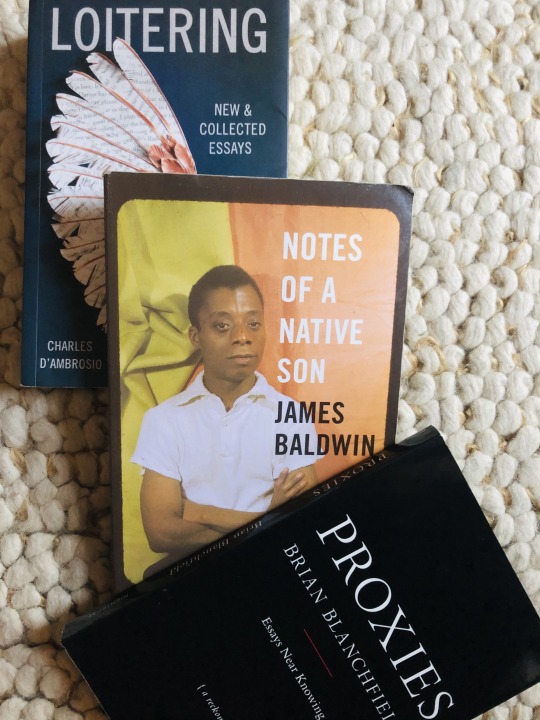
These three collections might be my bible for this project. Each are very different in style and application, but each is similar in that joyous experience of reading a paragraph and being so stunned by the insight that one has to turn the face away from the page for a moment (or two) to let it sink in. Baldwin is, of course, the king of this sort of thing. There were times while reading his essays when I actually had to straight up close the book and put it down in order to absorb what was going on. The title essay which is about Harlem, his father, and his early awakening to the depth of his country’s racism, is perfection on both the level of content and form. It does what an essay does best: leave you with the unequivocal residue of human feeling twisting around the grander issues with which that essay is concerned.
Each essay, in all of these volumes, is like a discrete nugget, a piece of writing, contiguous, open and alive, that can be read and reread, like an oracle you visit throughout your life, which, using the same words, speaks to you anew each time.
Ambrosio’s essays are absolutely nimble and virtuosic; his language is muscular and sinewy; his sentences are lean and long and you can ride them effortlessly and when you finish them and their paragraphs, you are left with an image of a truth that was planted in your sight without you knowing. It’s an exhilarating experience.
Blanchfield’s essays are a revelation of subjectivity. This volume was part of Chee’s reading list and I can’t express enough gratitude for having been directed to it. Perhaps Blanchfield is the master of nesting the autobiography within the confines of an essay. When he toggles between the external and the internal, you don’t notice it. It’s effortless. His ability to tell a giant story in one paragraph is inspiring. The tone and delivery is somewhat sacral, he’s a poet, after all. But it is also delicate, graceful, poised and elegant. And deeply personal. How someone can title an essay “On Frottage” and turn the reader’s attention to the true significance of the topic—AIDS and the gay scene in the 80s and 90s—and all of the social significance intertwined in it, along with implicating himself in a nakedly autobiographical way, is beyond me, but I am happy to be in the audience for it.
----------------------------------
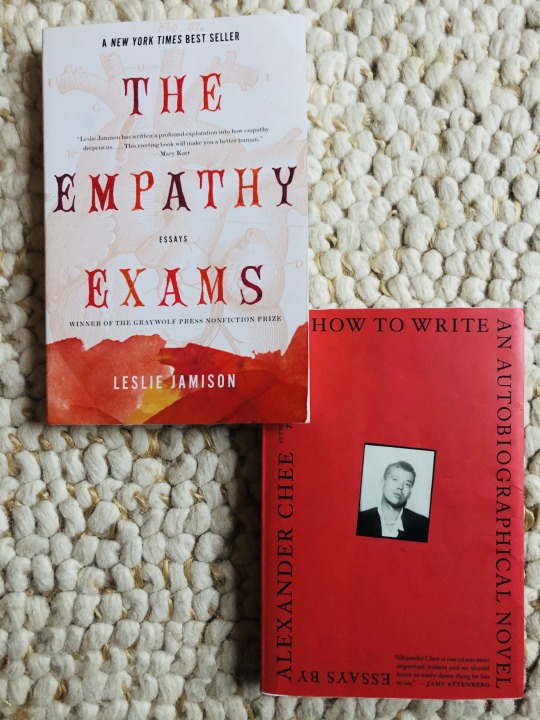
What I love about these two collections are their stealth and form. Their stealth comes from how they read, not so much as casually but as without artifice or adornment, and how this aspect lets the reader’s guard down, only to have some extremely penetrating conclusion arrive at the end of each essay, in a manner that the more plainspoken style did not necessarily anticipate. Chee’s prose particularly comes across as either supremely and dryly witty or as modest plainness, but when you finish one of his essays the takeaway is anything but those things; it is profound. Jamison as well. As for their form, they tend to do some adventurous things. One of Jamison’s essays uses a kind of diagram of storytelling which she learned in a writing class to “tell the story” of a traumatic episode involving a horrific episode of violence she experienced in South America. The essay is called “The Morphology of a Hit.” It’s a perfect example of something else that I really love about personal essays which is their ability to take leaps in form when that form enables a type of storytelling that otherwise isn’t possible. Chee does this very thing in a somewhat humorous essay, the titular one of this volume, which is just a long list of life hacks and writing tips. I’m really grateful for the insight that this man has given me into the writing process. My copy of his book is signed, as I first became aware of him at a reading of his with Edmund White at NYU which my good friend invited me to. So I’m very grateful to that friend as well! He also introduced me to Edmund White so it’s a double whammy!
----------------------------------
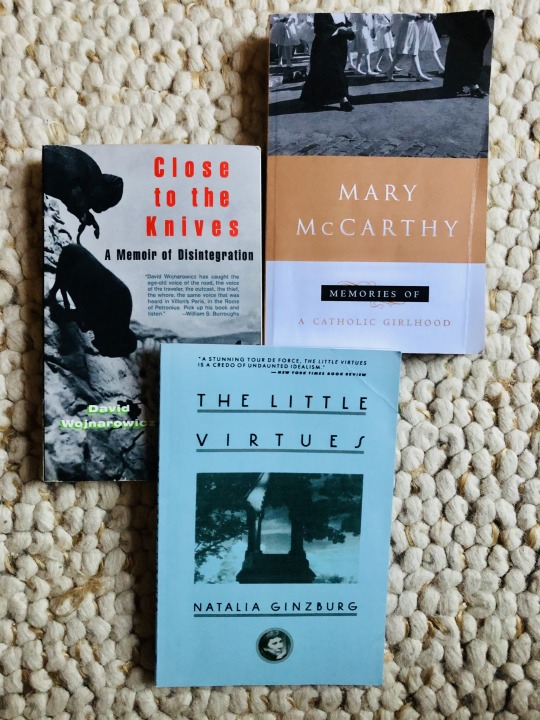
I would’ve never encountered these collections of my own volition without their inclusion on the reading list in Chee’s course, but I’m very happy that I read these. McCarthy’s essays are quite old, dating to the 50s and 60s, I believe, when they were originally published in The New Yorker. They’re all centered around her childhood years, either living with her grandparents or in an orphanage and they are remarkable portraits of intimacy and observation. The same with Ginzburg’s collection, although she writes in a much more enigmatic style. What inspired me most about her essays was how simultaneously aloof and vulnerable they are: she has a way of, say, writing about England, without ever even mentioning the name of the country, yet contriving a recognizable and incisive portrait of it, all from the vantage point of her own experience of the country during a certain time. Finally, there’s really nothing quite like Wojnarowicz’ book. It’s slightly Beat in tone, sometimes surreal and ecstatic, and then progressively more plainspoken and political. But it is all so very raw and pulsing with the heat of experience and desperation and anger. Wojnarowicz was an incredible artist, a sculptor and photographer and he lived in the East Village of the 80s and reports from the frontlines on the AIDS crisis. His work bears the stamp of a deeply tuned in artist confronting the hypocrisies and injustices of his time.
----------------------------------
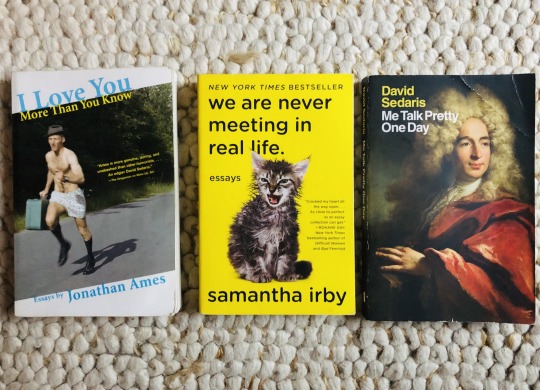
I put these three together mostly because these collections are explicitly comedic, although each has its own manner of using humor to communicate a deeper message. Jonathan Ames is well-known as a very funny novelist and the creator of the TV show Bored to Death. His essays are very short and very direct. There’s almost no commentary and he just narrates the events. The approach of leaving room for not knowing is very noticeable in his work, as he often qualifies his observations with humility and openness. The work comes across as very tender as a result. Irby is laugh-out-loud funny. I don’t know how she does it but she has a way of sending herself up and making fun of herself and her limitations that is both funny and painful at the same time. Commercialism, body positivity, and personal achievement are only some of the themes that are explored through that lens of self-effacement. Her ability to put herself under the most lacerating gaze of the authorial microscope and coming out the other end of that examination as a strong individual is unparalleled. I consider this volume must-reading material. In terms of exquisite construction and intelligence I would have to put Sedaris up high on the list, though his work is popular enough and his collections prodigious enough that his reputation for that kind of writing needs no further illustration here.
----------------------------------
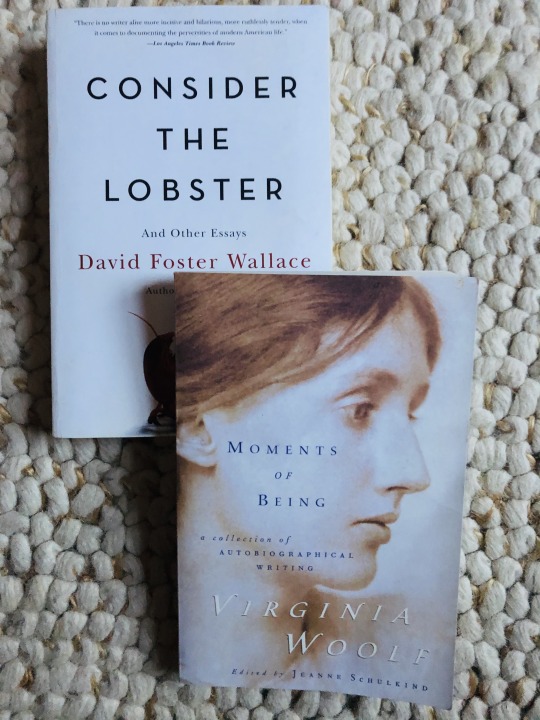
Virginia Woolf is popular as an essayist for collections published much earlier than Moments of Being, such as The London Scene. The essays here are actually very raw and unedited and so very sprawling, though obviously of high literary quality. She wrote them down like diary entries and then they were found after her death. They feel similarly to McCarthy’s essays in their naked observations of early childhood and family life. Juxtaposing this collection with DFW’s Consider the Lobster is a bold choice on my part, but it’s for the purpose of elucidating my previous point about that delicate “lean-to-fat” ratio I spoke about earlier in this blog post. Woolf’s posthumous collection is “all fat,” one could say, in that her focus is almost exhaustively on her own life and personal upbringing and subsequent marriage. These essays are basically memoir writing in the guise of the personal essay. DFW’s essays, by way of intense contrast, are almost “all lean,” in the sense that he spends almost no time talking about his personal life. The closest he gets to that is his essay on 9/11 where he goes over the details of where he was when it happened. The rest are what you’d expect from the author: penetrating accounts of the subtleties and hidden motivations of the cultures and people he investigates. He is basically like the most intelligent wartime journalist where his “wars” are the John McCain presidential campaign of 2000, the AVN Awards Ceremony, or the Maine Lobster festival.
----------------------------------
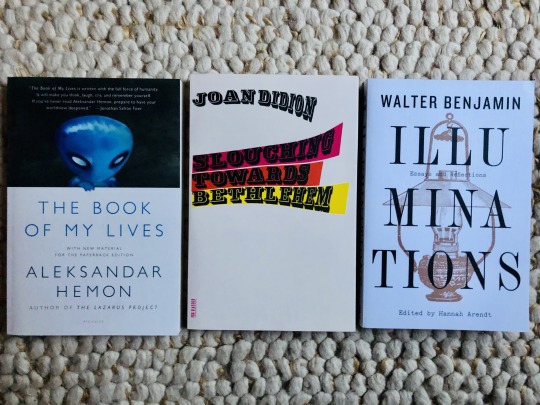
I have yet to read these collections but I’m very much looking forward to them. Hemon’s essays are about his upbringing in the war-plagued Balkans of the Nineties and subsequent emigration to the US. Didion’s basically needs no introduction as its de rigeur for essay writing. I’ve included Benjamin’s because of his critical insight. He’s not writing about his personal life, but his gifts for analysis will be really helpful to be exposed to for anyone undertaking the task of writing a personal essay. I have not included a picture of Susan Sontag’s collection Against Interpretation because it’s on order, but that one is also on deck. As are two other collections not pictured: Mary Oliver’s Upstream and Rebecca Solnit’s Hope in the Dark.
#charlesdambrosio#leslie jamison#james baldwin#vladmir nabokov#edmund white#frank mccourt#maya angelou#eveensler#joan didion#kay redfield jamison#jeannette walls#javiermarias#robert graves#elizabeth gilbert#hugohamilton#laurenslater#brianblanchfield#alexander chee#david wojnarowicz#mary mccarthy#natalia ginzburg#jonathanames#samantha irby#david sedaris#david foster wallace#virginia woolf#walter benjamin#aleksandar hemon#writing#memoir
17 notes
·
View notes